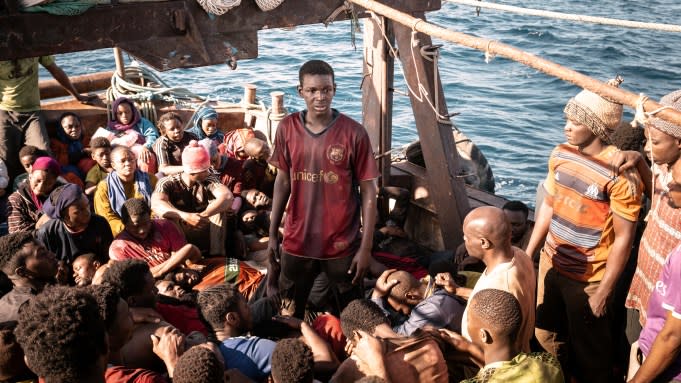‘Io Capitano’ Review: Matteo Garrone’s Stunning Film Puts a Human Face on the Migrant Crisis

- Oops!Something went wrong.Please try again later.
- Oops!Something went wrong.Please try again later.
- Oops!Something went wrong.Please try again later.

Editor’s note: This review was originally published at the 2023 Venice Film Festival. Cohen Media Group releases the film in theaters on Friday, February 23.
Like Africa’s “first” film “La Noir De…” (AKA “Black Girl”) (1966), “Io Capitano” begins in Dakar, Senegal. And just as in Ousmane Sembene’s masterpiece, the promise of Europe tempts a young protagonist away from its vibrant streets and warm community to be degraded, dehumanized, and abused. While “La Noir De…” saw a young woman arrive in Antibes, only to find life there a brutal and cruel nightmare that she cannot bear, “Io Capitano” follows 16-year-old Seydou and his cousin Moussa on a tortuous journey just to reach Italy’s shores.
More from IndieWire
Annie Awards 2024: 'Spider-Man: Across the Spider-Verse' Dominates with 7 Wins
Kate Winslet: I Chose to Do 'Small' Movies After 'Titanic' Because 'Being Famous Was Horrible'
From Italian director Matteo Garrone, best unknown for the unflinching Mafia thriller “Gomorrah,” which saw Naples become a hellish war zone, his latest is the first that sees Italy from an outsider’s perspective, gazing at it through the eyes of those who perceive it as the light at the end of a dark and twisted tunnel. By leaving the borders of his homeland, he has created an utterly stunning and uncommonly human look at the descent into Hades that so many people face when they journey to Europe, dreaming of creating a better life for themselves.
In what is one of the most impressive and transfixing acting debuts in recent memory, Seydou Sarr plays Seydou, and the film is fixed on his perspective. We meet him trying to sleep in his family’s tiny home filled with giggling sisters, telling his mother that he’s going to play football but secretly working on a building site to earn cash to pay for passage to Italy. The world around him is lit in jewel tones, with women dancing in colorful silks as he plays the drums and Black skin glimmering in the moonlight in a way that would make Barry Jenkins proud.
Seydou believes he can make it as a pop star in Europe, an ambition that is immediately heartbreaking to hear him recount, given how poor the odds of music stardom are even for the globe’s most talented and privileged young dreamers. Seydou is achingly naïve, even when warned by his mother that “those who left are dead in the desert! Do you know how many drowned in the sea?” Still, he is determined to make it across the continent and the Mediterranean to start a new life on Europe’s shores. Those who even glance at the news know that what lies ahead of them is likely to be horrific and probably deadly.
The film itself is inspired by real-life events, in which Garonne came across a story about a 15-year-old boy who had no nautical or navigation experience but was tasked by a people smuggler to take up the captain’s mantle and steer a boat carrying 250 people across the Mediterranean. But despite there being no shortage of hideous accounts of the journey to Europe for desperate African refugees, Seydou and his accompanying cousin have foolishly deep wells of optimism. Garonne uses their naivete to rachet up suspense, making each time they trust in the goodness of their fellow man feel like watching an inebriated teenage girl in a slasher movie enter a dark basement.
The journey takes them by bus to get fake Malian passports, then on to the border with Niger, and this is the first hint the two get that this may not have been what they were promised. In the film’s funniest moment, they are interrogated by a policeman on the border who questions how long they have had their passports. Having memorized the details, Moussa quickly replies, “2 years,” only to have the bemused officer look at the picture in the recently forged documents and ask, “You’ve worn the same clothes for two years?”
While that crossing can be fixed by a quick bribe, what the pair face on the next leg to Libya would befit the 7th circle of hell. They find themselves and their fellow migrants no longer regarded as human and at the mercy of sadists. Men, women, and children are left to die and desiccate in the Sahara, and they face levels of brutality that even Seydou’s mother could not have foreseen.
But Garrone’s film, for all that it contains that is not for the faint-hearted, never falls into unrelenting misery and nihilism. All along the way, there are small triumphs and warm kindnesses that provide glimmers of hope for humanity and give our young protagonist the strength to keep going. This is not so much a coming-of-age tale so much as it is a hero’s journey. On his Odyssey, Seydou is bent but never broken, and a 16-year-old boy proves to have the heart and resilience to navigate a world filled with monsters.
Sarr keeps glimmers of youthful optimism alive in his performance and, even when faced with piles of bodies or tasked with responsibilities that no person, let alone a child, should have to face, the boy who played the drums in Dakar will not have his dreams entirely ripped from him. In literal dream sequences, Garrone brings to the film an elegant magical realism rooted in the African spirit. Seydou sees bodies floating across the Sahara to safety or journeys to see his mother, guided by fantastical birdlike creatures and begs for her and his ancestor’s forgiveness. The characters may have the goal of Europe, but the film is most concerned about the African experience.
Sembene himself once said, “Europe is not my center. Why be a sunflower and turn towards the sun? I myself am the sun.” And while globalization, capitalism, and the legacy of colonialism may make our protagonists consider Europe as the promised land, Garrone does not betray Sembene’s perspective, with the continent and its inhabitants being the sun towards which we should all turn. Our hero is not superhuman, and nor is he an embodiment of the ideal refugee or a narrative vessel to simply endure all the world’s cruelty. Garrone’s film has a three-dimensional and devastatingly realized human soul at its core. The world could do with paying attention to Seydou’s story and the millions of other real ones like it.
Grade: A
“Io Capitano” premiered at the 2023 Venice Film Festival.
Best of IndieWire
Sign up for Indiewire's Newsletter. For the latest news, follow us on Facebook, Twitter, and Instagram.

